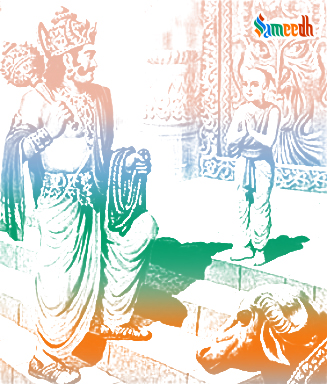Who was Nachiketa? His name seems heard. However, his significance seems to be lost on us.
Nachiketa, in Hindu mythology, is a young boy known for his deep wisdom and quest for spiritual knowledge. He is prominently featured in the Katha Upanishad, one of the ancient scriptures of Hinduism. The story of Nachiketa revolves around his encounter with Yam, the god of death.

BACKGROUND
Nachiketa, was the son of the sage Vajashravas. He is supposed to have been the first seeker in the world. The Rigved talks of Yam and a child, who may be a reference to Nachiketa. He is also mentioned in the Taittiriya Brahmana. Later, in the Mahabharat, the name appears as one of the sages present in the Sabha of King Yudhishthir and also in the Anushasan Parva. However, the primary story, dealing with the dialogue between Nachiketa and Yam, comes from the later Katha Upanishad.
LIFE
As the story in Katha Upanishad goes, very few people take this vow for spiritual attainment. Nachiketa’ s father Vajashravas, took this vow to donate all his possession. But Nachiketa, his son, noticed that Vajashravas was donating only the cows that were old, barren, blind, or lame. So, Nachiketa went to his father and started talking about this to him. A small boy about five years of age, but he had tremendous maturity. Nachiketa told his father, “What you have done is not right. Once you took the vow, you better give everything away. You tell me to whom are you going to give me?” His father got angry, and he said, “I am going to give you to Yam.” Yam is the Lord of Death. So, the boy took it very seriously and he prepared himself to go to Yam. And he went.
Yam was not there. For three days Nachiketa waited without food or water. After three days Yam came back and he saw a little boy famished and tired, yet determined. Yam was very moved by this boy’s determination. So, he said, “It is great you’ve been waiting for three days, I’ll grant you three boons. What do you want?”
For the first boon, Nachiketa said was, “My father is in extreme greed. He wants material possessions. Nachiketa asked for his father’s forgiveness and for his peace of mind. It was granted.
For the second boon he asked for was, “I want to know what kind of karmas, what kind of yagnas I have to do to gain attainment.” So, Yam taught him what he had to do.
For the third boon, Nachiketa then asked him, “What is the secret of death? What happens after death?” Yam said, “No, this question you will have take back. You can ask me anything material that you want. Nachiketa says, “What will I do with all of them? You’ve already told me; all these things are transient. So, what is the point in you giving me riches? It will just trap me. I don’t want anything; you just answer my question.”
Initially reluctant to grant the third boon, Yama finally agreed. He taught Nachiketa about the nature of the self (Atman), the cycle of life and death (samsar), and the ultimate truth beyond mortality. Through this discourse, Yam imparted deep spiritual wisdom to Nachiketa, guiding him towards the path of liberation (moksh).
LESSONS LEARNT
Yam was secretly pleased with this disciple and thus elaborated on the nature of the true Self, which persists beyond the death of the body. And they say, right on the doorstep of Yam’s domain, Nachiketa attained his full enlightenment. Thus, with the wisdom of the Brahman, Nachiketa returned to his father as a ‘jivan-‘mukta. Yam’s explanation is a succinct explication of Hindu metaphysics, and focuses on the following points:
- The sound Om is the syllable of the supreme brahman.
- The Atma, whose symbol is Om is the same as the omnipresent brahman. Smaller than the smallest and larger than the largest, the soul is formless and all-pervading.
- The goal of the wise is to know this Atma.
- The Atma is like a rider; the horses are the senses, which he guides through the maze of desires.
- After death, it is the Atma that remains; the Atma is immortal.
- Mere reading of the scriptures or intellectual learning cannot realize Atma.
- One must discriminate the Atma from the body, which is the seat of desire.
- Inability to realize Brahman results in one being enmeshed in the cycle of rebirths. Understanding the Self leads to moksh.
The story of Nachiketa is revered in Hinduism for his courage, intelligence, and unwavering pursuit of spiritual enlightenment. It symbolizes the importance of seeking knowledge, understanding the transient nature of life, and striving for spiritual growth.